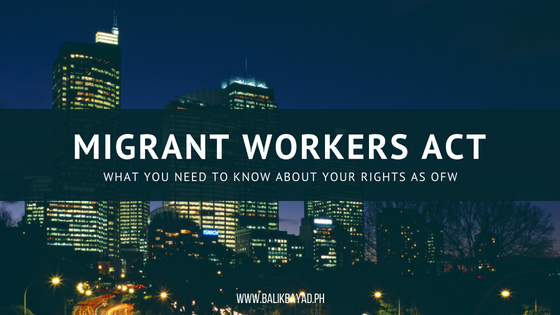They say learning doesn’t stop in school. That’s true. The more knowledgeable you are, the better the opportunities will be. If you are an Overseas Filipino Worker, then you need to make sure that you get as much knowledge as you can to be ahead of the pack.
In that case, you need to consider enrolling in workshops for added knowledge. If you are in the process of looking for a job overseas, these workshops could make your resume look good because of the added learnings you had.
The question now is what type of workshops should you enroll to?
Career-Specific Workshops
It’s not enough that you know how to make bread or operate a particular machine. Think of your skill as an art where it has to be honed, developed, and constantly improved on. If you have a specific skill, then look for trainings or seminars that will help you improve on it. TESDA regularly conducts trainings pertaining to various skills, so make sure to check it out as well.
Business Courses
If you are an existing business owner or a starting entrepreneur, then this type of workshop must be included in your list the next time you come home for a visit. This type of workshop is intended to help business owners succeed further in their chosen path.
Government agencies partner with one another to come up with trainings that assist business owners on how to boost sales profit using social media platforms, intensify presence in the digital market, improve inventory, and managing business difficulties among others. Private companies like Manila Workshops also organizes talks about “how to” Facebook Ads and applying SEO techniques to boost sales.
Added Income Workshops
Surprisingly, the money you earn in dollars is not enough to sustain your family’s everyday needs. If that happens, then you and your family need to start looking for additional income ideas to make ends meet.
The good news there are a lot of training centers that provide livelihood and training seminars for extra income. You or your spouse can learn about meat processing, baking and cake decorating, bread making, and noodle-making, especially if you like food.
If you’re not into food, there are seminars about soap or laundry detergent making for business, cologne making, basic tailoring and dressmaking, haircutting, and flower arrangement among many others. Explore your options because training centers have conduct various workshops every month.
Digital Literacy Trainings
Not everyone has access to computers or any other digital resources for added knowledge. When they finally experienced one, they don’t know what to do. Thankfully, OWWA, in partnership with Facebook, came up with digital literacy training to help departing OFWs. This will be a one-hour training integrated in the exit program of OFWs.
In this training, OFWs will be taught safety and security measures when using social media platforms like Facebook, which became a “lifeline” for many migrant workers. Spotting fake news, choosing who to accept as friends, and identifying scams will likewise be taught to protect departing workers.
Aside from this, you can find courses online about learning how to operate programs such as Microsoft Office, Adobe Photoshop, and the like.
Financial Literacy / Education
This is a must. Only a small number of families have decent and sufficient savings. The reason for lack of savings and investment? Most people don’t know or don’t understand how these work.
Change that by enrolling in classes that teaches financial literacy. Keep yourself informed about various investment products and how these could help during the rainy days. Preparing for the future is a must – and getting into financial trainings will keep you armed.
Take note that workshops often come with a fee. While these trainings give you additional knowledge, only go for those that will help you further in your current track and save experimentation later.

 In 1995, the Congress passed Migrant Workers and Overseas Filipino Act, which aims to protect and promote the welfare of migrant workers as well as their families. This includes instituting policies on deployment with other countries and fight against illegal recruitment among others.
In 1995, the Congress passed Migrant Workers and Overseas Filipino Act, which aims to protect and promote the welfare of migrant workers as well as their families. This includes instituting policies on deployment with other countries and fight against illegal recruitment among others. There are two types of Overseas Filipino Workers:
There are two types of Overseas Filipino Workers: